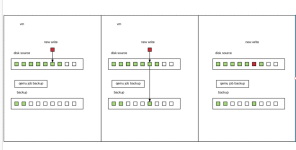Attempting to backup to the local storage instead of NFS produced nearly the same results. The system took a slightly longer time to go unresponsive, but still occurred.
On this particular node:
The local ZFS system has compression turned on, not sure how to accurately test the performance here.
And the NFS Share
Code:
Reply from: bytes=32 time<1ms TTL=127
Reply from: bytes=32 time<1ms TTL=127
Reply from: bytes=32 time=2592ms TTL=127
Reply from: bytes=32 time<1ms TTL=127
Request timed out.
Request timed out.
Request timed out.
Reply from: bytes=32 time=995ms TTL=127
Request timed out.
Request timed out.
Reply from: bytes=32 time=1323ms TTL=127
Reply from: bytes=32 time<1ms TTL=127
Request timed out.
Request timed out.
Request timed out.
Request timed out.
Request timed out.
Request timed out.
Request timed out.
Request timed out.
Request timed out.
Reply from: Destination host unreachable.On this particular node:
Code:
~# cat /etc/pve/storage.cfg
zfspool: local-zfs
pool rpool/data
content images,rootdir
sparse 1
~# zpool status
pool: rpool
state: ONLINE
scan: scrub repaired 0 in 0h7m with 0 errors on Thu Aug 24 09:22:23 2017
config:
NAME STATE READ WRITE CKSUM
rpool ONLINE 0 0 0
mirror-0 ONLINE 0 0 0
sda2 ONLINE 0 0 0
sdb2 ONLINE 0 0 0
mirror-1 ONLINE 0 0 0
sdc ONLINE 0 0 0
sdd ONLINE 0 0 0
mirror-2 ONLINE 0 0 0
sde ONLINE 0 0 0
sdf ONLINE 0 0 0
mirror-3 ONLINE 0 0 0
sdg ONLINE 0 0 0
sdh ONLINE 0 0 0
errors: No known data errorsThe local ZFS system has compression turned on, not sure how to accurately test the performance here.
Code:
# dd if=/dev/zero of=test1.img bs=20G count=1
0+1 records in
0+1 records out
2147479552 bytes (2.1 GB, 2.0 GiB) copied, 1.52511 s, 1.4 GB/sAnd the NFS Share
Code:
# dd if=/dev/zero of=temp.dat bs=20G count=1
0+1 records in
0+1 records out
2147479552 bytes (2.1 GB, 2.0 GiB) copied, 21.9257 s, 97.9 MB/s
Last edited:


